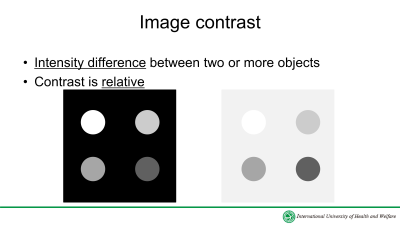Weekend Course
Introduction to MRI Physics for Clinicians
ISMRM & ISMRT Annual Meeting & Exhibition • 03-08 June 2023 • Toronto, ON, Canada

| 13:00 |
Spin Gymnastics
Walter Kucharczyk, Donald Plewes
Keywords: Physics & Engineering: Physics, Physics & Engineering: Nuclear Magnetic Resonance Synopsis: Spin Gymnastics is both an introduction to MRI physics and a summary of its most important concepts. It is intended to "set the table" for a series of subsequent lectures in the Physics for Clinicians Course that build on the basic concepts presented in this lecture. The information is presented in a graphical, animated format to assist in the complex understanding of the spatial and temporal components of the MR imaging process. |
|
| 14:20 |
Basic Artifacts: Explaining, Recognizing & Avoiding Them
Penny Gowland
Keywords: Image acquisition: Artefacts, Physics & Engineering: Physics, Physics & Engineering: Hardware This talk will explain the source of some common artefacts in MRI assuming and will be aimed at clinicians and technologists but may also provide a useful overview for physicists.It will consider how artefacts can be overcome or corrected post acquisition in some cases, and it will mention how the artefact processes link to useful aspects of MRI where relevant. It will start by considering the most common sources of artefacts in standard MRI and will then go onto consider some more interesting artefacts that are hopefully seen less frequently. |
|
| 14:50 |
Break & Meet the Teachers |
|
| 15:20 |
 |
Common Mechanisms of Contrast
Hiroyuki Kabasawa
Keywords: Education Committee: Clinical MRI This educational lecture will provide an overview of the image contrast mechanism of Magnetic Resonance Imaging (MRI). This lecture will focus on the common and basics MR image contrast based on magnetization relaxation. This presentation will cover the basics physics of MRI contrast generation, relationship between key acquisition parameters and image contrast, and acquisition parameter optimization for better image contrast. The course will be non-mathematical. The lecture starts with how MRI works, then break it down to contrast mechanism details. |
| 15:50 |
Sequences: Spin Echo, Gradient Echo, EPI, Magnetization
Preparation
John Mugler III
Keywords: Image acquisition: Sequences This presentation will first review the basic functional elements of a pulse sequence, and then discuss pulse-sequence types commonly used for clinical MRI, including gradient-echo and spin-echo based techniques, as well as echo-train implementations of both methods – echo planar imaging and fast/turbo spin echo. Magnetization preparation approaches will also be described, such as used for inversion recovery contrast (e.g., fat-signal suppression (“STIR”) or fluid-signal suppression (“FLAIR”)), fat suppression, or spatial presaturation. |
|
| 16:20 |
Fast Imaging: Parallel Imaging, Compressed Sensing & More
Maria Altbach
Keywords: Image acquisition: Fast imaging The Fast Imaging: Parallel Imaging, Compressed Sensing & More lecture will provide a high-level introduction to fast imaging acquisition techniques, parallel imaging, and reconstruction methods including compressed sensing and the new field of deep learning. Each topic will be described using diagrams and images to illustrate the techniques as well as their strengths and limitations. |
The International Society for Magnetic Resonance in Medicine is accredited by the Accreditation Council for Continuing Medical Education to provide continuing medical education for physicians.